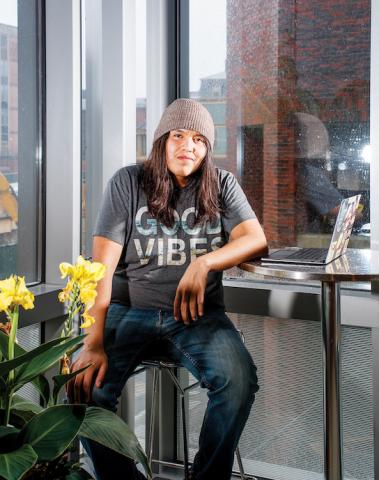Decoding drunk flies

By Brown Alumni Magazine
How do you collect and analyze detailed data when you’re studying miniscule, inebriated insects? In the world of alcohol addiction research, Tyler Blackwater ’19.5 has made life a lot easier. Fruit flies are genetically quite similar to humans, making them ideal for experiments. But the motions of the tiny flies are often imperceptible to the human eye, making it difficult and time-consuming to observe behavioral changes. At Brown’s Kaun Lab, where Blackwater has worked since his freshman year, fruit flies are used to investigate substance abuse. After previously exposing flies to alcohol, the Kaun Lab studies how their behavior changes when they’re triggered to remember being drunk, with the goal of gaining further insight into how addiction affects molecular and neuronal pathways related to memory.
Blackwater’s breakthrough was to painstakingly train some of the world’s most complex computer software to better analyze fruit fly movements, including the ability to recognize specific behaviors such as courting. Graphing this kind of data used to involve manually converting and labeling it, frame by frame; now it’s a click of a button.
“We had to teach the computer how to see the numbers in that way,” Blackwater explains, “how to understand what the fly is doing.”
He’s co-author on two pending publications documenting the methodology, but word of his work has gotten around. Other professional labs studying fruit fly behavior have reached out to understand his algorithms in order to apply them to their own research, says Professor Karla Kaun.
“His contributions are key to the findings we are getting,” Kaun says. “Understanding behavior in this amount of detail is unprecedented.”
Blackwater, who studies computational biology, says he simply “wanted a challenge, and research gave that to me.” Awarded a prestigious Howard Hughes Medical Institute grant last summer, he has researched protein design at the University of Washington and become well versed in six programming languages and a variety of specialized software platforms. But when he first came to Brown, he felt lost. He’d grown up on the Navajo Nation reservation in Arizona, and living with his dad in a rural area, miles from the nearest town, he’d never owned his own phone, had a bank account, or done any form of research. He says a sub-par education system also left him significantly behind, requiring him to retake classes like calculus.
“I was like a kid lost in the jungle,” Blackwater remembers. “I had thoughts of, ‘Can I make it?’ I debated whether I should keep going—whether I mattered here.”
He persevered, applying the same work ethic he’d learned from his dad while doing construction jobs and car maintenance. When Kaun—who grew up in a small Native American community, in her case in Canada—reached out to invite Blackwater to work in her lab, he was thrilled.
“I’ve always been a curious man because of how I was raised in an isolated environment,” Blackwater says. “I wanted to know more about life, and that’s what’s been fueling my curiosity in science.”
He hopes to one day run his own lab. “The thing that keeps me motivated is that sense of discovery,” he says. “No matter what research field I devote myself to, there will be that sense of belonging and passion as a scientist.”—Jack Brook ’19



